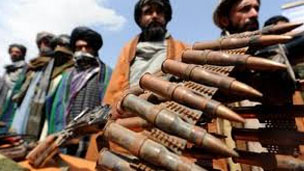The killing of senior Haqqani network leader Naseeruddin Haqqani has fuelled talks of a rift between Pakistan’s spy agency Inter-Services Intelligence (ISI) and the militant Haqqani network.
The killing of senior Haqqani network leader Naseeruddin Haqqani has fuelled talks of a rift between Pakistan’s spy agency Inter-Services Intelligence (ISI) and the militant Haqqani network.
According to a report in the News International, the reason behind this apparent shift in the equation could be the Haqqani network’s involvement in several acts of terrorism in Pakistan.
“This is happening mainly because of the network’s involvement in several acts of terrorism in Pakistan while working in tandem with the Tehreek-e-Taliban Pakistan (TTP). The group is considered by many as one of the ISI’s strategic assets,” the report said.
Naseeruddin Haqqani, the son of Haqqani network leader Jalaluddin Haqqani, was killed in a firing incident in Islamabad on Sunday night.
Naseeruddin Haqqani was responsible for fund-raising, logistics and political affairs of the Haqqani network.
While confirming the firing incident, Islamabad police did not reveal the identity of the man. The News International report said Naseeruddin Haqqani might be killed by his friends-turned-foes in the Pakistani establishment.
The Pakistani Taliban has blamed the ISI for Naseeruddin Haqqani’s murder and has vowed to take revenge, the report said.
According to the report, the Haqqani network was involved in some of the biggest terror attacks in Kabul, including the January 2008 suicide assault on the Serena Hotel, the February 2009 assault on Afghan ministries, and the July 2008 and October 2009 suicide attacks on the Indian embassy in Kabul.
It added that the US intelligence agencies had confronted the Pakistani government with evidence hinting at the ISI’s direct involvement in the 2008 Indian embassy suicide bombing.
The Pakistani authorities, despite under pressure from the US, were reluctant to act against the Haqqanis.
But the situation has now changed.
“The situation seems to have changed quite rapidly, with many in the Pakistani establishment considering the Haqqani militant network as a liability rather than an asset,” the daily’s report said.
“In fact, the (Pakistan) establishment is lately perturbed over (the) increasing number of intelligence reports of ever-growing cooperation between the TTP and Haqqanis, especially while carrying out terrorist activities which are directed against the Pakistani security forces in the tribal belt,” the report said.
Putting the blame of Naseeruddin Haqqani’s death on the ISI, a spokesman of the Haqqani network said: “But he had refused to mediate further following Hakimullah’s death and the subsequent announcement of TTP not to hold any further talks. Naseeruddin’s reluctance to mediate after Hakimullah’s killing must have annoyed the powerful agency to an extent that it decided to eliminate him.”
Naseeruddin Haqqani’s killing in the country’s capital has brought a lot of shame for the Pakistani government, which has so far had refused allegations of sheltering the Haqqani network.
-IANS





